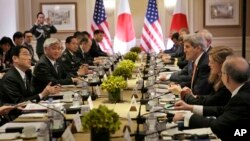A new defense pact between the United States and Japan that will give Tokyo’s forces a more ambitious global role provoked wary reactions from neighbors South Korea and China Tuesday.
Even though South Korea may stand to benefit from a stronger Japanese military presence to counter the North Korean threat and China’s rising power, officials remain reluctant because of lingering tensions over Tokyo’s wartime past.
South Korea’s Defense Ministry spokesman Kim Min-seok was non-committal when asked about the revised U.S.-Japan defense guidelines and what it meant for Seoul. Kim said South Korea’s participation in the agreement still needs to be worked out.
The guidelines allow for Japan to exercise “collective self-defense” to aid other countries in the region that come under attack. And they endorse a Japanese cabinet resolution last year expanding the military’s role by reinterpreting the country’s post-World War II pacifist constitution.
U.S. Secretary of State John Kerry said Washington has an “iron-clad” commitment to Japan’s security. He also said that commitment covered all islands under Japan’s administration, including the Senkaku islands, which China claims as its own and calls the Diaoyu islands.
Tough neighborhood
North Korea’s growing nuclear threat has been cited to justify the need for a stronger Japanese military. Japan has also voiced concern about what it has said is China’s growing assertiveness when it comes to its territorial claims and its military’s lack of transparency.
In a white paper on defense last year, Japan said Beijing’s assertiveness in the air and at sea is posing threats to regional stability, and highlighted China’s unilateral establishment of an air defense identification zone over a large part of the East China Sea including the Senkaku islands.
Beijing maintains that its rise is peaceful and has accused Japan of “deliberately exaggerating” what it calls the “China threat.” But Tokyo is not alone in raising its concerns about Beijing’s assertiveness.
China insists its territorial claims are based on historical fact and immutable, but its claims frequently are at odds with that of its neighbors. In the South China Sea, China claims most of the area is its sovereign territory, even parts that are well within neighboring countries’ exclusive economic zone.
Waiting, watching
North Korea has raised its concerns about the U.S.-Japan agreement.
Pyongyang’s official state news agency KCNA issued an editorial Tuesday condemning the agreement, calling it a “serious threat to peace on the Korean peninsula and security of the nation.”
In China, authorities said they will be watching to see how the alliance develops and the direction it takes. Foreign Ministry spokesman Hong Lei noted that while the U.S.-Japan alliance was forged during the Cold War, “the Cold War ended a long time ago,” he said.
Speaking at a regular press briefing on Tuesday, Hong said what would be key is whether the alliance benefits peace in the region and avoids hurting the interests of any third party, including China.
Hong said U.S. officials briefed Beijing on the new agreement before it was announced. He said China voiced its strong objections to the agreement’s mentioning of the Senkaku islands.
China’s Communist Party backed newspaper, the People's Daily, said in an editorial Tuesday that the guidelines will not “drown out pragmatic cooperation” but also that “the U.S. cannot change the trend of China's rise even if it uses Japan as a 'chess piece.' ”
Imbalancing act
South Korea and the U.S. are strong military allies, but Seoul also has strong economic ties to Beijing. Both Seoul and Beijing also have been highly critical of what they perceive as efforts by Japanese nationalists including Prime Minister Shinzo Abe to downplay atrocities committed during Japan's rise as a colonial power from the beginning of the twentieth century until the end of World War Two.
Seoul and Tokyo also have their own conflicting claims to a group of small islands and even disagree on the name of the sea that separates the two nations. In Japan, it is known as the Sea of Japan and in South Korea as the East Sea.
Hosaka Yuji, a political science professor at Sejong University, said tensions between South Korea and Japan have made it more complicated to contain and deter their common enemy, North Korea.
Hosaka said decisions made under the alliance between the U.S. and Japan affect the alliance between the U.S. and South Korea. And South Korea needs to discuss the parts that overlap with the alliance between the U.S. and Japan separately and thoroughly.
South Korean media reaction has been critical of officials in Seoul for not clearly stating and defending their position on the revised guidelines.
Japan's Abe is visiting Washington this week, where he will address a joint session of Congress to underscore the strong alliance that has developed between the two countries, since they fought against each other in World War II, 70 years ago.
Seoul news producer Youmi Kim also contributed to this report.
